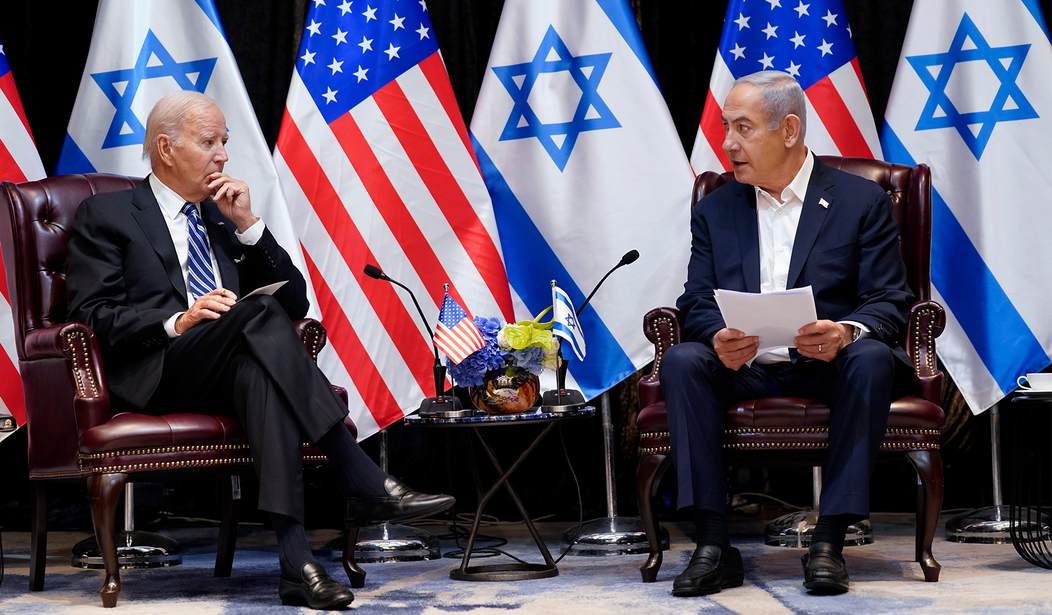"The United States has looked powerless and even irrelevant in recent days as Netanyahu has shrugged off President Joe Biden’s appeals and pressed ahead with attacks," write NBC News writers Dan De Luce and Abigail Williams. The article, "Netanyahu, not Biden, is setting the agenda in the Middle East," paints a damning picture of the decline of American influence in the Middle East and around the world.
Biden is worried about his "legacy"? This is Biden's legacy, his gift to future generations: a weak, former superpower whose influence beyond our own hemisphere is shrinking.
The most striking evidence we have of America's waning influence was the lack of notice given to the U.S. about the IDF's recent bombing campaign in Lebonon. Defense Secretary Lloyd Austin is reportedly furious with Israeli Defense Minister Yoav Gallant because he didn't give the U.S. a heads-up about the targeting of Hezbollah leader Hassan Nasrallah.
"Multiple times, the US has urged Israel to act less aggressively or not to take certain actions against Hezbollah, to avoid" a larger war, writes the Jerusalem Post. The same was true in the decision to withhold information from Austin on the Nasrallah strike. The Israelis knew that Biden would have urged Netanyahu not to kill their deadly enemy for fear of setting off a regional war.
Netanyahu now appears ready to take that risk. And if Iran wants to go toe-to-toe with Israel, they're welcome to try.
At the recent opening of the UN General Assembly, U.S. Secretary of Statre Antony Blinken shuttled between several delegations, trying to bring about a 21-day ceasefire between Israel and Hezbollah.
The Biden administration was so confident in the proposal’s success that a senior administration official briefing reporters after its public debut suggested both parties’ agreement was a foregone conclusion.
American and European officials believed they were moving closer to a possible deal, but then came the television images of a massive plume of smoke rising over southern Beirut.
President Joe Biden, Pentagon senior leaders and other senior officials across the administration were infuriated by the timing of the Israeli government operation, U.S. officials said.
Netanyahu and the Israeli government don't care. They aren't fighting to achieve the goals of the U.S. They're fighting to rid their nation of an existential threat to their existence.
If Biden wants to lobby for the continued existence of Hezbollah, he will be doing it alone. Biden's position appears to be that because Hezbollah is a player in the Middle East, they need to be treated as equals and afforded all the considerations of a normal, civilized nation.
They aren't equals, they aren't civilized, and they certainly aren't normal. Yes, Netanyahu is gambling that Iran won't start a full-scale war and draw in nations like Syria, Turkey, and Saudi Arabia. But from where I'm sitting, it's a pretty good gamble with a huge upside. Ridding Israel of the Hamas/Hezbollah threat for a decade would allow for more moderate forces (and moderates are willing to live and work with Israel) to emerge.
It's certainly better than the constant state of war Israel has been in.
“The choices that all parties make in coming days will determine which path this region is on with profound consequences for its people now and possibly for years to come,” Blinken said Friday after the strike that took out Nasrallah.
In the days after the Oct. 7 attack, Biden fervently embraced Netanyahu and Israel, literally and figuratively, calculating that unvarnished American support for the Jewish state would result in a willingness to accede to some American demands.
Instead, over the past year, Biden and his aides have appeared to have steadily less influence with Netanyahu.
In Asia, China's rise has Japan talking about forming an "Asian NATO" to counter the threat from Beijing as well as North Korea. In Europe, the EU is ready to "go it alone" in supporting Ukraine while the former Soviet republics of Poland, Hungary, and the Baltic States speak of forming their own defense league.
The rapid decline of American influence in most of the world is due to the perception of weakness imparted by the Biden administration. We saw it in the withdrawal from Afghanistan. We've seen it at the border, where drugs and traffickers are overwhelming our attempts to stop them.
Other nations see this and take note of our ineptness and confusion. In Moscow, Beijing, and in London and Paris, all take note of the changing balance.
And the U.S. and the world become less safe.










